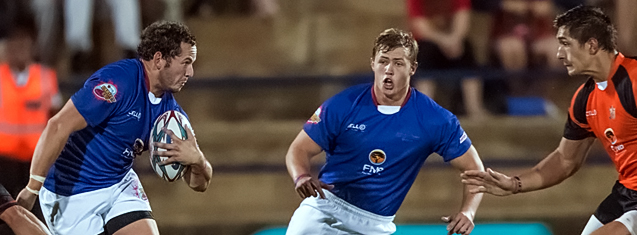
The Shimlas overpowered a startled UJ side in Bloemfontein on Monday, scoring seven tries en route to a 52-16 victory in the fourth round of the Varsity Cup competition.
The UFS’s second win in four weeks saw them climb the log standings to a well deserved third position. The Shimlas took an early lead in the match, with blindside flank Oupa Mohoje scoring the opening try from an attacking line-out.
Our boytjies was on a roll, with wing Maphuto Dolo scoring in the corner after a break from a scrum by scrumhalf Kevin Luiters. Kovsies' flyhalf Gouws Prinsloo knocked both conversions over to put our team in a commanding 16-0 lead before the first strategy break. Not long after, the Shimlas scored their third try as left wing Sethu Tom found the corner to make it 21-0. T his was followed by yet another onslaught when Shimlas’ skipper, Joubert Engelbrecht, crashed over for the bonus-point try. Outside centre, Tertius Kruger, put even more pressure on the UJ side when he crossed the try line, leaving the Shimlas with a 34-0 lead at half-time.
Prinsloo slotted a penalty early in the second half for Shimlas, followed by skipper Engelbrecht’s second try. After 15 minutes into the second half, UJ managed to score two converted tries to change the scoreboard to 44-16. T his did, however, not spur the visitors on to complete a comeback and the Shimlas' Divandré Strydom gave our team the last say with one final try.
The scorers:
For FNB UFS-Shimlas:
Tries: Oupa Mohoje, Maphuto Dolo, Sethu Tom, Joubert Engelbrecht (2), Tertius Kruger, Divandré Strydom
Cons: Gouws Prinsloo (5)
Pen: Gouws Prinsloo